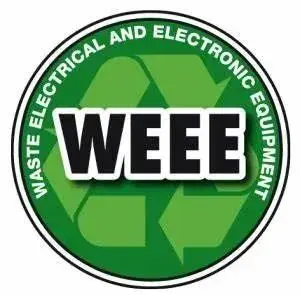
Waste Electrical and Electronic Equipment (WEEE) Directive
In our rapidly advancing technological environment, electronic devices have become an integral part of our daily lives. However, the increased use of electronic devices also means an increase in electronic waste, which presents a significant environmental challenge.
The EU Waste Electrical and Electronic Equipment (WEEE) Directive aims to address this environmental issue by regULating the disposal and recycling of electronic waste.

What is the weee directive?
The WEEE Directive regulates the disposal and recycling of electrical and electronic equipment (EEE) by requiring companies to register their EEE, promote the disposal and recycling of EEE products, and provide recycling services.
The WEEE Directive came into effect in the EU in 2003 and was revised in 2012. Since then, additional requirements and changes have been implemented to accommodate the ever-evolving technological world and improve reporting. These changes include establishing standardized registration and reporting formats, as well as altering data calculation methods.
While this is an EU law, it impacts companies worldwide because international businesses must comply with EU regulations to keep their products in the EU market. Other jurisdictions around the world, including U.S. states and Canadian provinces, have also adopted similar WEEE-like regulations.
Who needs to comply with WEEE?
Manufacturers and importers are the primary targets of weee compliance. If your company manufactures EEE and sells it in the EU market, you may be requiRED to comply with weee requirements. This includes both EU and non-EU manufacturers selling products within the EU.
EEE distributors may also bear responsibility under WEEE regulations. They must ensure the products they sell comply with WEEE legislation and assist in returning old electronic products when customers purchase replacements.
Categories of Waste Electrical and Electronic Equipment
EEE types subject to the WEEE Directive are divided into six categories:
1. Temperature Exchange Equipment – This includes electronic and electrical devices that use substances other than water for heating and cooling, such as refrigerators and heat pumps.
2. Large Screens and Displays – Applies to EEE with a screen size larger than 100 cm², and the main function of the EEE is to display information.
3. Lamps – Includes fluorescent lamps, LEDs, HID lamps, and LPS bulbs and tubes.
4. Large Equipment – Any device not falling into the first three categories with external dimensions greater than 50 cm. This may include washing machines, medical equipment, ATMs, vending machines, power tools, and more.
5. Small Equipment – Any device not falling into the first three categories with external dimensions less than or equal to 50 cm. This can include small household appliances and consumer electronics.
6. Small IT and Telecommunications Equipment – Includes devices with external dimensions of 50 cm or less, such as mobile phones or tablets.
WEEE Compliance Steps
1. Registration and Reporting
The first step in WEEE compliance is to register your manufactured EEE products in each EU member state where you sell them. Although WEEE is an EU-wide directive, each member state has its own registration agency.
You must also report the quantities of EEE products distributed in each country/region. The frequency of these reports will vary by country/region, with some requiring annual reports, others quarterly, and so on.
2. Product Disclosure and Labeling
To comply with WEEE, you must provide the appropriate labeling and disposal/recycling instructions for your products.
Every product must be marked with the weee symbol (a crossed-out wheeled bin), indicating that it should not be treated as general waste.
Your product must also include instructions for disassembling and disposing of it. This should include guidance on how to safely dismantle the product and recommendations for disposal or recycling.
3. Recycling System
You need to establish a set recycling system for products that require safe disposal and/or recycling. This may involve working with authorized recycling entities or joining a collective recycling program. However, even if you collaborate with other organizations to implement this system, you must be able to fund this solution.
Email:hello@jjrlab.com
Write your message here and send it to us
 IEC 60529 IP Rating Ingress Protection Standard
IEC 60529 IP Rating Ingress Protection Standard
 IEC 60601-1 Medical Electrical Equipment Basic Saf
IEC 60601-1 Medical Electrical Equipment Basic Saf
 European Authorized Representative Medical Devices
European Authorized Representative Medical Devices
 EU Waste Electrical and Electronic Equipment Direc
EU Waste Electrical and Electronic Equipment Direc
 How to Get CE Approval
How to Get CE Approval
 Accelerated Ageing Test
Accelerated Ageing Test
 IP Ingress Protection Testing
IP Ingress Protection Testing
 How Does a Product Get an Energy Star Label
How Does a Product Get an Energy Star Label
Leave us a message
24-hour online customer service at any time to respond, so that you worry!




